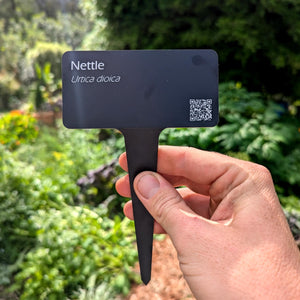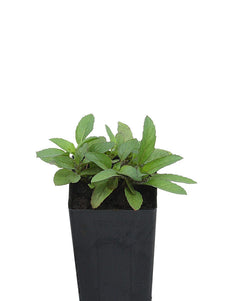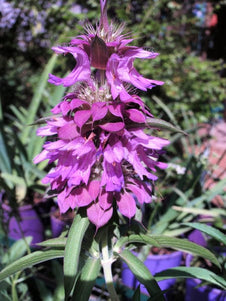







Bergamot - Lemon Bergamot
Bergamot - Lemon Bergamot

- In stock, ready to ship
- Inventory on the way

Usually available: All year
Life cycle: Annual
Height: 60 - 90cm
Position: Full sun
Soil preference: Moist / well drained
This is how we pack and send your Herb Plants to all states except TAS & WA
You will receive
- 1 Lemon Bergamot Herb Plant in a 50 X 75mm tube - General growing instructions
All of our Herb Plants are grown organically with certified organic potting mixes and fertilizers
Botanical Name: Monarda citriodora
Lemon bergamot is a fast growing, annual herb reaching 60-90cm. When crushed the leaves have a fragrance reminiscent of lemons. Some people describe it as being like oregano, especially later in the season on older leaves. The plant forms a clump with several stems growing out from the centre. The green leaves are 3-8cm long, lanceolate to oval shaped, ending in points. Whorls of white, pink or purple flowers are arranged around the thin stems, creating a lovely flower show.
Lemon bergamot comes from the mint family and may be called Lemon Bee Balm, Lemon Mint or Purple Horsemint, particularly in the United States. The name of this species is derived from the Latin for ‘citrus smell’. It is a bee, butterfly and hummingbird attractant in its native habitat.
Lemon bergamot is native to much of the United States and Mexico. It is often found growing on roadside verges in California and other sunny states such as Florida. Nebraska and Texas are also locations where lemon bergamot finds an ideal environment. The clay soils of the ‘high grass prairies’ are ideal conditions for this American ‘wildflower’. In some of these areas, the plants grow widely creating the impression of a blanket of flowers when in summer bloom.
Growing Conditions
Lemon bergamot prefers a high percentage of clay in its soil, but it is important to choose an area which is not at risk of water logging. Lemon bergamot is drought tolerant and can tolerate a good deal of lime or alkaline soils. It grows naturally in the limestone barrens, slopes and savannahs.
Lemon bergamot does best in full sun and grows quickly during spring. This herb flowers in late spring to mid-summer and will happily drop its seeds in readiness for next year. If you are happy to have a regular supply of lemon bergamot in the garden, it will continue to self-seed each year. The seeds require temperatures of at least 20C for germination. The plant will die down each year when cold or frosty conditions develop. However, this usually annual herb may grow for longer periods in the warm and tropical regions. It can grow well in pots if the climate is too cold or space is limited.
Culinary Uses
Lemon bergamot can be used to impart a subtle lemon flavour to dishes, especially desserts like cheesecakes, biscuits, cakes and sauces. The flavour is also imparted in fish dishes, salads, dressings, teas, wines and liqueurs. The flowers are edible and may be used decoratively as garnishes. The leaves can be chopped and placed in ice cubes for later use.
Common bergamot is sometimes called Oswego Tea because it was used as a tea by the Oswego Native American tribe. This tea was introduced to the shakers after tea became scarce after The Boston Tea Party. There are also reports that lemon bergamot was treated in the same way, although this may simply be confusion.
Medicinal Uses
The essential oil in lemon bergamot is citronella and it is also rich in phenolic monoterpenes and thymol. This provides the plant with good anti-oxidant and antibacterial properties. It has been used medicinally for coughs, colds, fevers and respiratory ailments. Traditional uses also included treatment for intestinal parasites, and to repel fleas and mites. It is likely that lemon bergamot has similar uses to the common bergamot, Monarda didyma.
Lemon bergamot may be used as a facial steam and for aromatherapy. It may be combined with chamomile and lavender for a facial steam that is very useful for oily skin and acne.
Other Uses
Lemon bergamot may be rubbed directly on the skin for use as an insect repellent.
All information provided on this website is for informational purposes only. Please seek professional advice before commencing any treatment.





